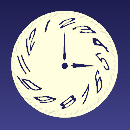

Our DSPS Question and Answer document is now available in German, too. Thanks to member Homo Sapiens Asynchronous [a pseudonym] for doing the translation!
If any of you has the linguistic expertise to translate our other documents or web pages into German or any other language, please do so. It can help raise awareness in non-English-speaking countries, and provide material for people with circadian rhythm sleep disorders to pass on to their doctors, family, and employers. Send submissions to .
Darren Hill, Beth Macdonald, and Peter Mansbach were re-elected to two year terms. Asli Kumcu was newly elected to a two year term, and Andrew Wall was newly elected to a one year term. Welcome to the new Board members, and thanks to all who ran.
Background: seven candidates were nominated for five open slots. Members who were current on their dues on Nov 30 were eligible to vote Dec 1 - 15. Details, and candidate information, is available to members only on our Election page. Members can see the detailed results by following the link in the email they received allowing them to vote. It's the same link used to vote during the voting period.
Circadian Sleep Disorders Network submitted comments to the FDA (U.S. Food and Drug Administration) docket (collection of comments) on narcolepsy patient-focused drug development. You can view the comments here.
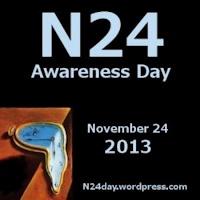 Talk to someone about it! Raise awareness! Explain what it is, that it affects sighted as well as blind individuals, how it impacts people's lives, that it is physical and is reflected in people's biomarkers, and that treatment often does not work.
Talk to someone about it! Raise awareness! Explain what it is, that it affects sighted as well as blind individuals, how it impacts people's lives, that it is physical and is reflected in people's biomarkers, and that treatment often does not work.
This event was started last year by the Facebook group Non 24-Hour Sleep-Wake Syndrome Support Group. A web page was recently posted at n24day.wordpress.com describing this event and offering to post links or content.
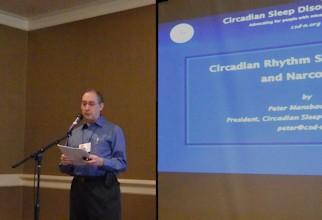 Peter Mansbach, our president, gave a talk on "Circadian Rhythm Sleep Disorders and Narcolepsy" at the Narcolepsy Network Conference in Atlanta on October 19, 2013. The talk introduced DSPS and Non-24, and made some connections with narcolepsy. You can read the prepared text, and view the slides.
A video version of the slides with the talk as audio is available on YouTube. The talk was well attended (perhaps 75 people) and well received.
Peter Mansbach, our president, gave a talk on "Circadian Rhythm Sleep Disorders and Narcolepsy" at the Narcolepsy Network Conference in Atlanta on October 19, 2013. The talk introduced DSPS and Non-24, and made some connections with narcolepsy. You can read the prepared text, and view the slides.
A video version of the slides with the talk as audio is available on YouTube. The talk was well attended (perhaps 75 people) and well received.
The National Sleep Foundation, in response to our email campaign last spring, has added Delayed Sleep Phase Disorder and Circadian Rhythm Sleep Disorders to their Sleep Disorders drop-down list on their home page. The new entries link to descriptions which I believe were pre-existing, but hard to find. Thank you to all those who emailed, and thank you to NSF. Together we have a voice!
Some background: Recently the National Sleep Foundation (NSF) created a new set of web pages on non-24 with some serious and harmful misinformation. Thanks to our members' emails to them, NSF has changed the most objectionable statement to our satisfaction and added a link to our website. However, they still had not listed DSPD at all.
So we urged our members again to write them. And they did. The NSF has now added DSPD.
Details of our email campaigns, including instructions and sample emails, are here (first campaign, emphsizing the non-24 pages), and here (second campaign, emphasizing the lack of DSPD information).
Our next campaign will be to get NIH (U.S. National Institutes of Health) to add circadian rhythm disorders to their web pages - after the government reopens, and the folks there have had time to catch up.
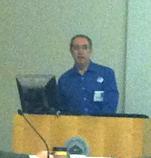 Our president, Peter Mansbach, presented some thoughts at the NIH (U.S. National Institutes of Health) Sleep Disorders Research Advisory Board meeting on Sept 23. These included the need for research on a combination treatment of light therapy in the morning plus light restriction in the evening, plus a renewed push to get circadian sleep disorders listed on the NIH web site. The text of the talk, together with a brief summary of other topics discussed, appears
here.
Our president, Peter Mansbach, presented some thoughts at the NIH (U.S. National Institutes of Health) Sleep Disorders Research Advisory Board meeting on Sept 23. These included the need for research on a combination treatment of light therapy in the morning plus light restriction in the evening, plus a renewed push to get circadian sleep disorders listed on the NIH web site. The text of the talk, together with a brief summary of other topics discussed, appears
here.
Last February's comments are still available here.
A video re-enactment of the second half of that presentation, describing the concerns with current research, is
here.
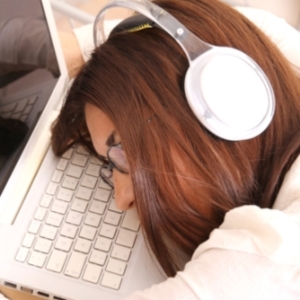 A fifth article in a series on DSPS was recently published on salary.com, featuring an interview with CSD-N member Tina Garner on how she has
managed her career as an engineering design drafter. Tina was able to shift her schedule using light therapy. This article is titled
Are Night Owls Lazy Employees?
A fifth article in a series on DSPS was recently published on salary.com, featuring an interview with CSD-N member Tina Garner on how she has
managed her career as an engineering design drafter. Tina was able to shift her schedule using light therapy. This article is titled
Are Night Owls Lazy Employees?
The previous articles, in reverse chronological order, are
Dr Robert Thomas, in a summary of the recent SLEEP 2013 conference, reported that "Circadian biology [was the] best part of the meeting. Dysregulated internal timing is a terrible thing - most organ systems are impaired - metabolism, cognition, mood, cancer risk possibly, vascular function.... Melatonin testing in saliva and/or urine is now strongly recommended (but not covered by insurance...)."
Dr Thomas, a sleep medicine physician, is a member of our Medical Advisory Board. The SLEEP conference is the annual conference of the AASM (American Academy of Sleep Medicine) and the SRS (Sleep Research Society), and showcases recent research papers.
On May 31 Circadian Sleep Disorders Network's president, Peter Mansbach, and vice president, James Fadden, met with representatives of Vanda Pharmaceuticals, makers of tasimelteon, a proposed drug for treatment of Non-24 in blind people. [Webmaster note: after FDA approval this is being marketed under the brand name Hetlioz.] The main purpose of the meeting, from CSD-N's point of view, was to emphasize that Non-24 also occurs in sighted people, and to get Vanda to acknowledge that on their websites and on the National Sleep Foundation website (Vanda sponsored the Non-24 pages on the NSF website). Also present were CSD-N Medical Advisory Board members Dr Charles A Czeisler and (by phone) Dr Steven W Lockley.
The Vanda representatives acknowledged that Non-24 also occurs in sighted individuals. We all disliked what NSF had done with the non24 website. Vanda wanted us to understand that they did not write it, and that they were just as upset with it as we were. They also wanted us to understand that while the application for tasimelteon is pending, Vanda is prohibited from commenting on any other potential uses (other than Non-24 in the blind). So they have to be careful not to suggest an interest in Non-24 in sighted patients, in connection with their drug.
James shared his life story as a sighted person with non24. We feel it's important for them to hear this personal testimony.
Dr Czeisler indicated that he was really glad we had formed Circadian Sleep Disorders Network. He has long felt the need for a patient advocacy group for circadian sleep disorders.
 At our urging, NORD, the National Organization of Rare Diseases (www.rarediseases.org)
has added Non-24-Hour Sleep-Wake Disorder to their list of rare diseases. Special thanks to James Fadden, our vice president, who wrote up an excellent description of the disorder, supported by references to the research literature; and to Dr Katherine Sharkey, on our medical advisory board, who edited it and
supported our application. The writeup can be viewed at www.rarediseases.org/rare-disease-information/rare-diseases/byID/1275/viewAbstract. You need to sign up at NORD [free] to see the full text.
At our urging, NORD, the National Organization of Rare Diseases (www.rarediseases.org)
has added Non-24-Hour Sleep-Wake Disorder to their list of rare diseases. Special thanks to James Fadden, our vice president, who wrote up an excellent description of the disorder, supported by references to the research literature; and to Dr Katherine Sharkey, on our medical advisory board, who edited it and
supported our application. The writeup can be viewed at www.rarediseases.org/rare-disease-information/rare-diseases/byID/1275/viewAbstract. You need to sign up at NORD [free] to see the full text.
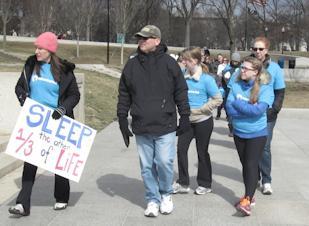 Some walkers in the National Sleep Walk |
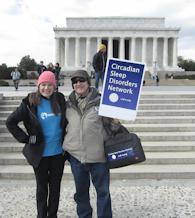 Walk organizer Julie Flygare and CSD-N president Peter Mansbach after the walk |
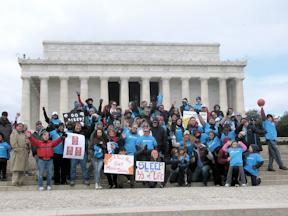
Assembled group before the walk
Circadian Sleep Disorders Network is an affiliate sponsor of the third annual U.S. National Sleep Walk, to "celebrate sleep health & sleep disorder awareness in our nation's capital". We got a nice paragraph on their affiliates page, our name on the back of their T-shirts, and a mention in their press release.
The walk was held March 3 at the Lincoln Memorial in Washington, DC. It was scheduled an hour later than previous years, in part due to our lobbying. We even won a Sleep Spirit Award for our CSD-N sign! (see photo above right)
This is scheduled in conjunction with the (U.S.) National Sleep Foundation's National Sleep Awareness Week®, March 3-10.
Circadian Sleep Disorders Network was recently accepted as the newest member of NSART, the National Sleep Awareness RoundTable. This is part of NSF, the (U.S.) National Sleep Foundation, operating under a grant from CDC, the (U.S. government) Centers for Disease Control.
Our president, Peter Mansbach, presented some information about CSD-N at the meeting on Feb 28. The text of the talk, together with a brief introduction to NSART, can be viewed
here.
 We posted a video re-enactment of part of this year's presentation to the National Institutes of Health by Peter Mansbach, our president, at
youtu.be/Wc7AmksLV44.
This excerpt lays out two of our concerns regarding current research on treatments for circadian rhythm sleep disorders.
The full text is available at
www.circadiansleepdisorders.org/docs/NIH-13-02-25.php.
We posted a video re-enactment of part of this year's presentation to the National Institutes of Health by Peter Mansbach, our president, at
youtu.be/Wc7AmksLV44.
This excerpt lays out two of our concerns regarding current research on treatments for circadian rhythm sleep disorders.
The full text is available at
www.circadiansleepdisorders.org/docs/NIH-13-02-25.php.
A video re-enactment of last year's presentation is still available at
youtu.be/reOpxPFRuvE.
That presentation introduced CSD-N and our mission to NIH.
Archived News 2011 - 2012 (incomplete)